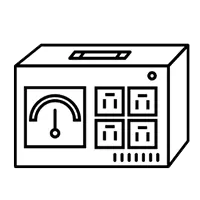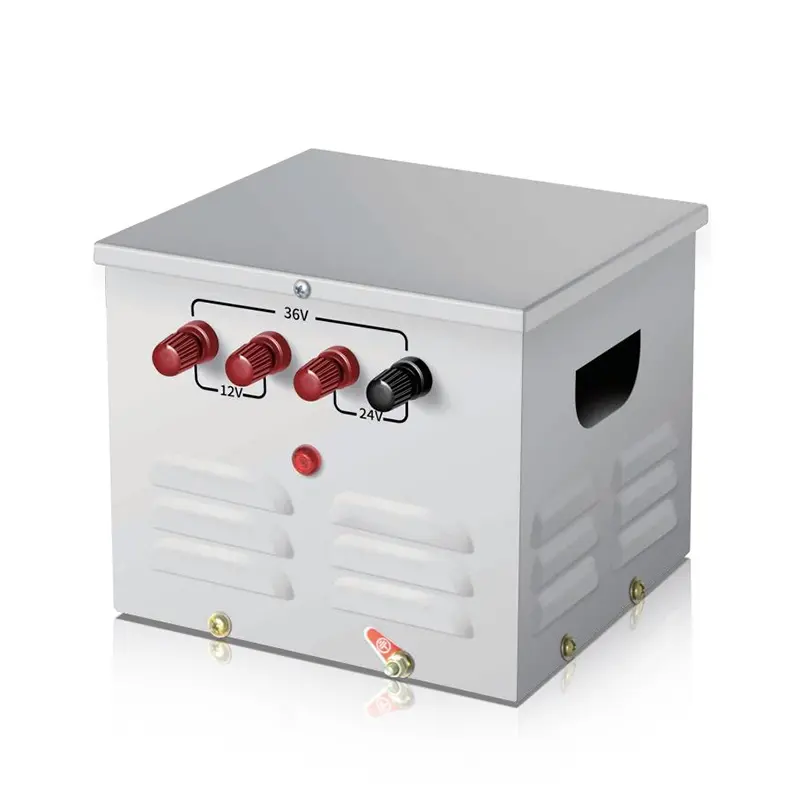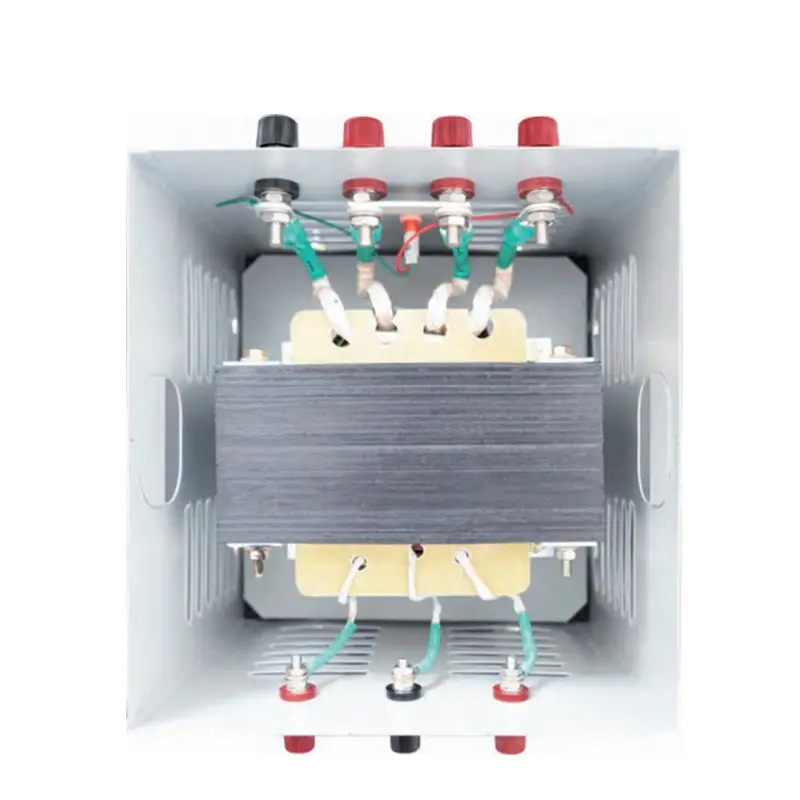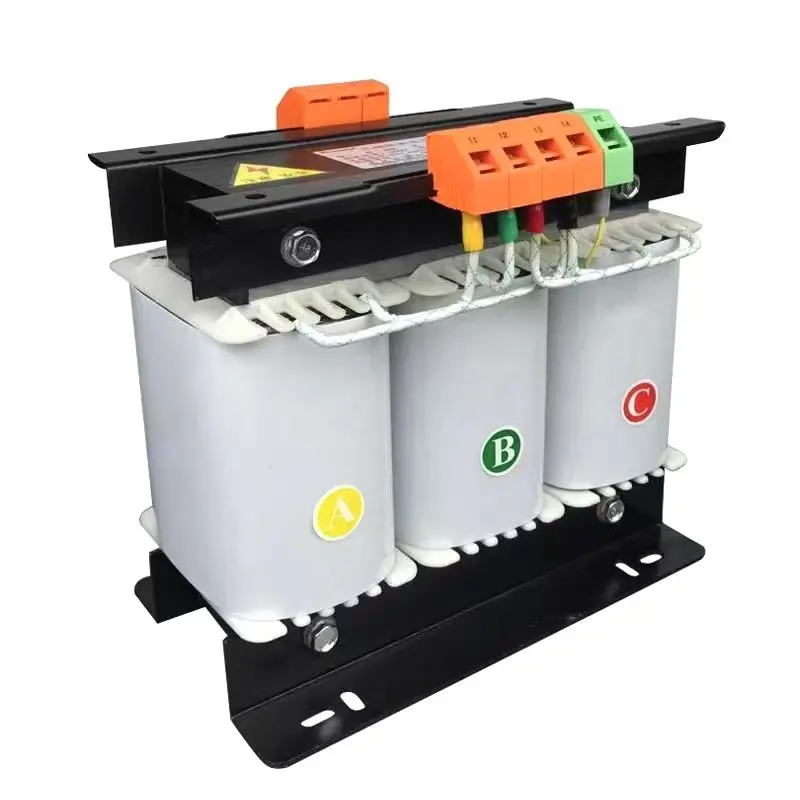Nos sistemas eléctricos modernos de hoje, manter energia segura, estável e sem interferências é crucial. Um componente pequeno mas vital que torna isto possível é o transformador de controlo - um dispositivo compacto mas potente, concebido para fornecer tensão estável a circuitos de controlo em aplicações industriais e comerciais.
Geralmente utilizado em máquinas-ferramentas, equipamento de automatização, sistemas de iluminação e circuitos de sinalização, a transformador de controlo assegura que os dispositivos eléctricos funcionam de forma segura e eficiente, fornecendo a tensão precisa exigida pelos componentes de controlo.
Como fabricante de confiança de transformadores industriais, ZHENGXI é especializada na produção de transformadores de controlo de elevado desempenho que satisfazem as necessidades de ambientes eléctricos exigentes em todo o mundo.
O que é um transformador de controlo?
A transformador de controlo, também conhecido como transformador de potência de controlo, é um transformador de tipo seco que fornece uma tensão estável e fiável para circuitos de controlo elétrico, luzes de sinalização, relés, contactores e outros dispositivos de controlo de baixa potência.
Funciona normalmente a AC 50Hz ou 60Hz com tensões nominais até 1000Ve foi concebido para funcionamento contínuo em condições de plena carga.
A maioria transformadores de controlo industrial função como transformadores abaixadores - por exemplo, convertendo 380V a 36V ou 220V a 24V - garantir que os operadores possam controlar as máquinas com segurança, sem exposição a alta tensão.
Essencialmente, um transformador de controlo não só ajusta os níveis de tensão como também fornece isolamento elétrico, estabilidade da tensãoe supressão de ruídotornando-o indispensável nos modernos sistemas de automação e controlo.
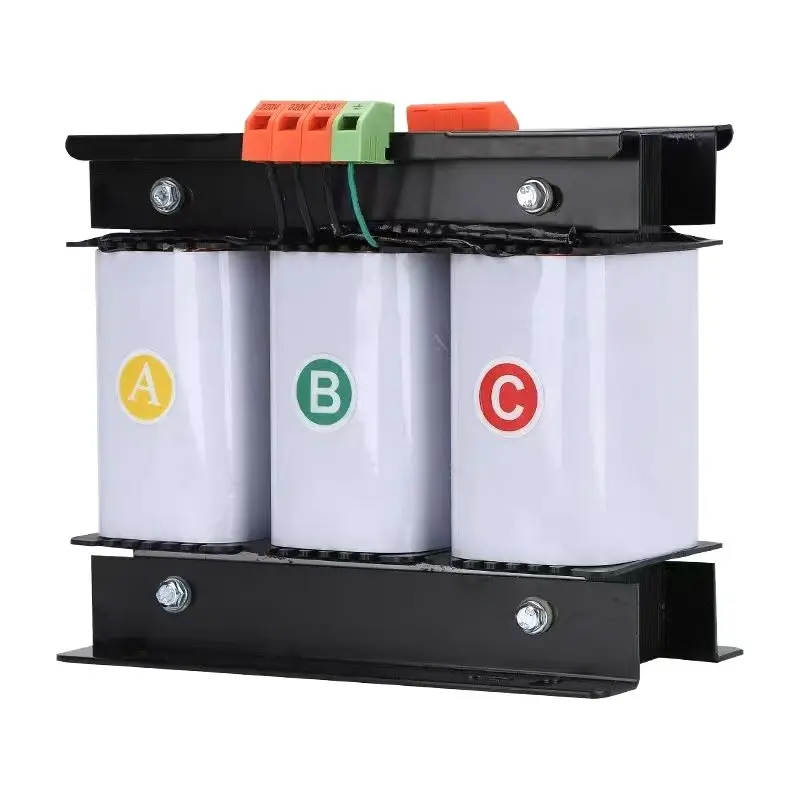
Como funciona um transformador de controlo?
O princípio de funcionamento de um transformador de controlo baseia-se em indução electromagnéticasemelhante à de um transformador de potência normal.
É composto por três partes principais:
- Bobina primária: Ligado à fonte de alimentação de entrada.
- Bobina secundária: Fornece a tensão de saída transformada.
- Núcleo de Ferro: Forma um caminho magnético que liga as duas bobinas.
Quando a corrente alternada (CA) flui através do enrolamento primário, uma alteração do campo magnético é gerado no núcleo de ferro. Isto induz uma força eletromotriz (FEM) no enrolamento secundário, produzindo a tensão de saída necessária.
O rácio de tensão entre as bobinas é determinada pela rácio de rotações dos enrolamentos.
Por exemplo:
Se o primário tiver 500 espiras e o secundário tiver 250 espiras, e a tensão de entrada for de 220 V, a tensão de saída será de aproximadamente 110 V.
Esta conceção simples mas robusta permite transformadores de controlo para fornecer tensão de controlo estável e sem interferênciasprotegendo os circuitos sensíveis das flutuações e do ruído elétrico.
Principais funções de um transformador de controlo
A transformador de controlo desempenha várias funções críticas em sistemas eléctricos e de automação:
- Conversão de tensão
Converte a alta tensão em tensões mais baixas e mais seguras exigidas pelos circuitos de controlo, iluminação e equipamento de sinalização (por exemplo, 380V → 36V). - Proteção de isolamento
Separa eletricamente os circuitos primário e secundário para evitar choques eléctricos e aumentar a segurança do operador. - Estabilidade da tensão
Mantém uma tensão de saída constante apesar das flutuações de entrada ou das alterações de carga, assegurando um desempenho de controlo estável. - Redução do ruído e das interferências
Reduz as interferências electromagnéticas (EMI), melhorando o desempenho e a vida útil dos dispositivos de controlo sensíveis. - Eficiência energética
Concebidos para perdas reduzidas e produção mínima de calor, transformadores de controlo industrial oferecem um funcionamento duradouro e energeticamente eficiente.
Aplicações típicas dos transformadores de controlo
Transformadores de controlo são amplamente utilizados em sistemas eléctricos industriais e comerciais, incluindo:
- Máquinas-ferramentas e máquinas CNC
- Sistemas de automação industrial
- Painéis de controlo de AVAC e ar condicionado
- Circuitos de iluminação e sinalização
- Bancos de ensaio eléctricos
- Caixas de distribuição e armários de controlo
Por exemplo, num Torno CNC, a Transformador de controlo 380V/36V fornece uma tensão baixa e segura aos circuitos de controlo - protegendo os operadores e assegurando um controlo suave da máquina.
Transformador de Controlo vs Transformador de Isolamento
Embora transformadores de controlo e transformadores de isolamento partilham caraterísticas estruturais semelhantes, mas os seus objectivos diferem significativamente:
| Caraterística | Transformador de controlo | Transformador de isolamento |
|---|---|---|
| Função principal | Fornece uma tensão estável para os circuitos de controlo | Garante o isolamento elétrico para segurança |
| Aplicação | Utilizado no controlo de máquinas, iluminação e automação | Comum em ambientes médicos, de testes e de reparação |
| Tipo de carga | Cargas de controlo constantes e de baixo consumo | Isolamento de cargas de uso geral |
| Foco no design | Capacidade de sobrecarga a curto prazo e regulação da tensão | Separação eléctrica completa e proteção de segurança |
Porquê escolher os transformadores de controlo ZHENGXI?
Como fabricante líder de transformadores de controlo industrial, ZHENGXI concebe e produz transformadores de alta eficiência e baixa perda que cumpram com normas internacionais de segurança e satisfazer diversas necessidades de aplicação.
As nossas vantagens incluem:
✅ Alta eficiência: Perda de energia reduzida e acumulação de calor mínima para um desempenho contínuo.
✅ Design duradouro: Construída com chapas de aço silício de primeira qualidade e enrolamentos de cobre 99,9%.
✅ Opções de tensão personalizadas: Disponível em várias configurações de tensão e capacidade.
✅ Segurança fiável: Excelente desempenho de isolamento e baixa interferência electromagnética.
✅ Certificações globais: Certificação CE, ISO9001 e RoHS para conformidade internacional.
Se precisa de um monofásico ou transformador de potência de controlo trifásico, a ZHENGXI pode fornecer soluções personalizadas que garantem um desempenho estável nas suas aplicações industriais específicas.
FAQ sobre transformadores de controlo
Q1: Qual é a diferença entre um transformador de controlo e um transformador de transformador de potência?
A transformador de controlo é optimizado para cargas pequenas e consistentes e tensão secundária estável, enquanto um transformador de potência trata do transporte e da distribuição de energia em grande escala.
P2: Um transformador de controlo pode ser utilizado como transformador de isolamento?
Nalguns casos, sim. No entanto, um transformador de controlo centra-se na regulação da tensão e no desempenho de sobrecarga a curto prazo e não no isolamento completo.
Q3: Quais são as tensões nominais comuns para os transformadores de controlo?
Os modelos típicos incluem 380V/220V, 380V/110Ve 220V/36V, com opções personalizadas disponíveis a partir de ZHENGXI para satisfazer as necessidades específicas dos clientes.
Q4: Durante quanto tempo pode um transformador de controlo funcionar continuamente?
Transformadores de controlo ZHENGXI são concebidos para serviço contínuoO sistema de controlo de temperatura é um sistema de controlo de temperatura que mantém uma potência estável sob carga nominal durante longos períodos.
Conclusão
A transformador de controlo é um componente crítico na moderna sistemas de automação industrialgarantindo um funcionamento seguro, estável e fiável dos circuitos de controlo.
Com décadas de experiência no fabrico e um forte enfoque na qualidade e na inovação, ZHENGXI fornece um serviço fiável transformador de controlo industrial soluções para clientes em todo o mundo.
👉 Explore a nossa gama completa de transformadores de controlo ou solicitar um modelo personalizado hoje para satisfazer as suas necessidades específicas de energia industrial.
Blogues relacionados
Como identificar um transformador de isolamento - Testes práticos, pistas da placa de identificação e lista de verificação do comprador
Qual é a diferença entre um autotransformador e um transformador de isolamento?
Transformador de isolamento Preço e guia de compra
Produtos relacionados
Transformador de controlo de redução de iluminação portátil monofásico JMB 25Va~50Kva
Transformador de controlo trifásico de tipo seco de alta eficiência 500va-1000Kva 415V 400V 380V
JBK 25va-5000va Transformador monofásico de isolamento de controlo de máquinas do tipo seco 220v a 110v
Transformador de potência de controlo de isolamento monofásico Bk 100va-5kva
O Série BK transformador de potência de controlo de isolamento monofásico (vulgarmente designado por Transformador BK) fornece tensões de controlo estáveis e isoladas para equipamento industrial e comercial. Disponível a partir de 100 VA a 5 kVAA unidade utiliza um módulo de controlo de tiristores (SCR) com feedback para fornecer uma regulação precisa da tensão em circuito fechado, mesmo quando a alimentação de entrada flutua.
Este transformador de controlo é construído de acordo com as normas internacionais de segurança e eficiência e é perfeito para máquinas CNC, PLCs, painéis de automação, circuitos de iluminação e outros sistemas de precisão que necessitam de uma alimentação de controlo estável.





